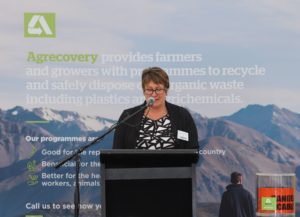Agrecovery Chair Adrienne Wilcock on the NZ Rural Waste Minimisation Project launch
Good morning and welcome. It’s great to see you all here today. I’d especially like to welcome Minister Eugenie Sage, our Associate Minister for the Environment for attending and we will hear from her shortly.
As we are all aware, plastic waste has become a huge issue – not just in New Zealand – but worldwide. After years of the perceived convenience of plastic packaging, we have finally woken up to the mess mankind is making and now we face the challenge of how to avoid, reduce or ethically dispose of it.
We’ve seen single-use plastic bags banned from supermarkets and the banning of scrap plastic imports to China. Customers are asking manufacturers to step-up and provide solutions for their packaging. You could argue that it’s akin to a revolution – a waste revolution.
I’m very proud to say that Agrecovery has been providing such a solution for rural waste for over a decade. The Agrecovery Foundation started in 2006, setting its sights to clear plastic agrichemical containers from farms and orchards around the country. Not by burning them, burying them, or sending them to landfill – which is what happened until then. Industry decided that there had to be another solution; that this waste could be made into something useful here within New Zealand. It was not to be left on the land to become a problem for someone else. We did this together because we wanted to create a better future for New Zealand.
This is not an easy task and it takes a real team effort to get something like this off the ground. It involves commitment at all stages of the product lifecycle. A commitment from the manufacturer who makes the product, a commitment from the distributors who sell the product and help provide an access point for returning empty containers, and all of you as well. We couldn’t do this without your commitment to protect the environment; and be a good steward of the land that your business relies upon.
It couldn’t be done without farmers and growers who take the time to look at the products they’re buying to see if they can be recycled, for triple-rinsing them and for bringing them back for recycling. So thank you!
Thanks to the manufacturers who fund our programme, by paying a levy on all products sold.
Thanks to the 100 sites around our country who receive the containers for us, who educate customers on recycling, and inspect the containers on delivery.
Because if one of these groups did not support our programme, it would not be the success it is today.
We weren’t forced to set up the programme then, we did it voluntarily. It’s a product stewardship scheme that’s been expanding now for 10 years.
Over this decade, Agrecovery has collected close to 2,500 tonnes of rigid plastics; and safely disposed of almost 150 tonnes of unwanted agrichemicals.
Despite this success, we know that there is still more to be done and farmers still resort to harmful disposal practices. This is due to cost, a lack of awareness, a lack of incentives, and inconvenient disposal methods.
It’s time to take the lead and make a difference.
It is critical that we take responsibility for all plastics used on farms, including silage wrap, fertiliser and seed bags which have long been problematic, and meet these challenges head on. We are all about creating a positive legacy for dealing with this waste.
We know that over 50 percent of agrichemical containers are successfully repurposed through Agrecovery and made into useful products for New Zealanders.
We also know that we can do better!
To this end, we will be undertaking an exciting project, which Minister Sage is going to launch this morning. We feel this is a good fit for us in our ambition to be global leaders in managing rural waste.
The Rural Waste Minimisation Project will attempt to make it easier for farmers and growers to recycle.
We will do this by bringing more people together, bringing more waste streams together, and by creating efficiencies for the safe disposal of waste.
This project will see us conducting one-stop-shop events for rural inorganic waste across six regions. This will allow farmers and growers to bring in a variety of waste for safe disposal all at once. Whether this is oils, agrichemicals, plastic containers, fertiliser bags or silage wrap. This will help reduce the costs and barriers to recycling.
Last year we conducted two pilot trials for the project. These were the first of their kind. They were completed over two days and diverted almost 20 tonnes of agricultural waste. This year we will have events in Selwyn, Gisborne, Buller, Southland, Matamata and Geraldine.
We have an ambitious target of an 85 percent increase in the sustainable disposal of waste by 2022.
I want to acknowledge Plasback for their valued collaboration and for their work in managing soft plastics. Thanks also to our councils and the Ministry for the Environment, for their part in helping the programme as well.
On that note, please join us in this revolution to end harmful waste practices not just for us, but for our future generations – our mokopuna.
Thanks again for taking an interest in the recovery of farm waste and we invite you to check out the Agrecovery display inside the covered marque.
Now I would like to invite the Minister for Conservation, Minister for Land Information New Zealand and Associate Minister for the Environment to speak.
Minister Eugenie Sage has been a very passionate environmentalist for a long time. She has been a Green MP for eight years. And, prior to this, was an elected Environment Canterbury regional councillor.

